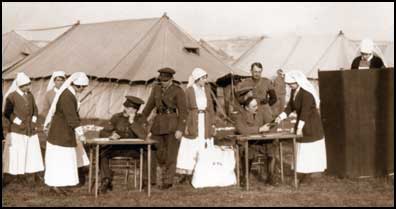- Women in the DCB/DBC
- Winning the Right to Vote
- Introduction
- Women Voting before 1851
- Coming Together to Demand the Vote
- The Right to Vote and Women’s Demands
- Relations with Militants and Organizations in Other Countries
- The Right to Vote in Municipal Elections
- The Right to Vote in Provincial and Territorial Elections
- The Right to Vote in Federal Elections
- Indigenous Women’s Right to Vote
- Opposition, Indifference, and Doubt
- Suggested Reading
The Right to Vote in Federal Elections

Source: Link
|
Date |
Eligibility Criteria |
|
20 September 1917 |
– Wives, widows, mothers, sisters, and daughters of members of the armed forces who were British subjects and met age, race, and residency qualifications – British subjects in active military service |
|
24 May 1918 |
British subjects, 21 years or older, who satisfied the criteria of property ownership in their province of residence |
|
1 July 1920 |
British subjects, 21 years or older |
In the middle of the national debate on conscription in 1917, the government of Sir Robert Laird BORDEN (prime minister from 1911 to 1920) granted certain women the right to vote in federal elections. Less than a year later, his government extended the eligibility criteria for female suffrage:
“The enfranchisement of women, partially granted in 1917 as a partisan political ploy, was extended [in 1918] to include all eligible females for the purposes of national elections.”
Suffragists such as Marie LACOSTE (Gérin-Lajoie) saw to it that women took advantage of the right at the earliest opportunity:
“[In 1921], for the first time, Canadian women would be called to the polls. Understanding the importance of the moment, Marie organized various events to raise awareness, such as a ‘civics course’ for women at the Université de Montréal, where lecturers outlined the major principles of public action and gave practical explanations about the vote. This huge effort to inform, which also included a press campaign, produced concrete results: a great many women cast ballots without incident.”
To learn more about winning the right to vote in federal elections, we invite you to consult the following lists of biographies:





